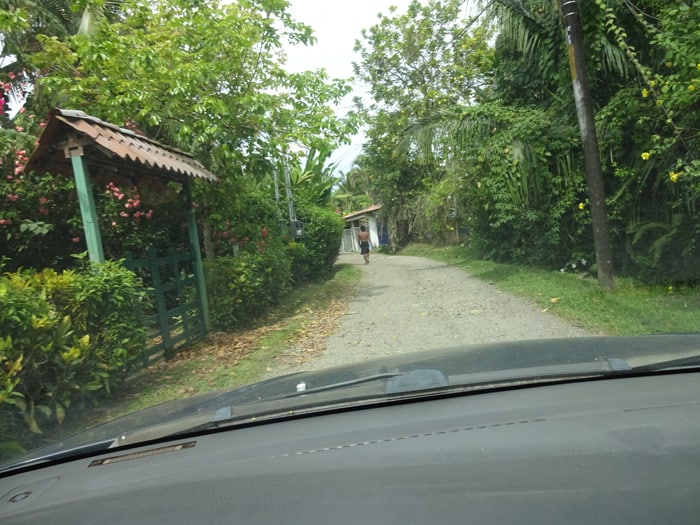PUERTO VIEJO, Limón – A couple of months ago, the police in this area introduced a new, electronic sheriff of sorts – a WhatsApp group where citizens can report petty crimes as they’re happening or suspicious characters as they’re spotted, and the police can respond in real time.
Known as Unidos Por el Caribe Sur, “United for the South Caribbean,” this app exploded with reports of shady people and petty abuses, as I learned when the police allowed me to sign up for three days (space is limited to 100 users, and the police vet every person who wants to join). This app has led to the arrests of a couple of reputed drug dealers and other delinquents caught up in its net of citizen-police interaction.
This app was fascinating to me, as I knew that in March 2013 the U.S. Embassy placed a travel alert on its website warning that U.S. citizens who come to Puerto Viejo, on Costa Rica’s southern Caribbean coast, should beware of armed robbery. The alert is still in force today, although the gang of robbers who prompted it was captured long ago.
Representatives of the U.S. Embassy met with U.S. expats here two weeks ago to discuss the possibility of lifting the alert, and everyone I talked to about this thinks it should be lifted.
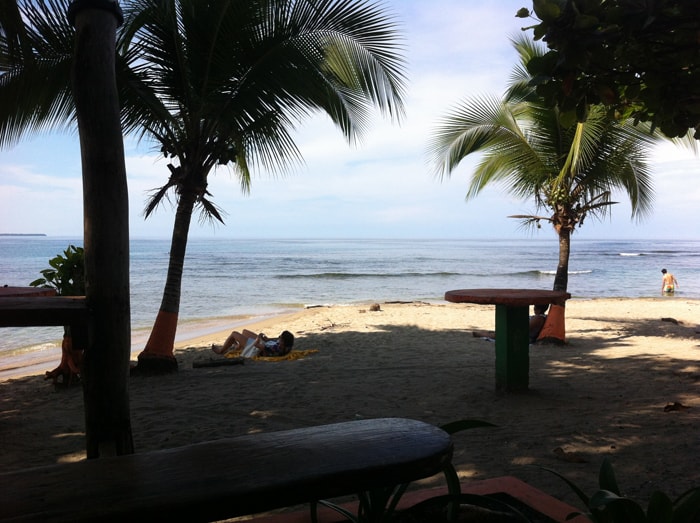
“We don’t believe that this area is any more dangerous than many other areas in Costa Rica,” said local business owner Janet Jones. “It’s so cliché to say the dark Caribbean coast is dangerous. If I didn’t feel safe, I would be in the U.S. immediately.”
J.T. Ficociello, the 42-year-old owner of Kaya’s Place lodge and craft brewery in Puerto Viejo, strongly agreed.
“For the U.S. Embassy to have a warning over this place is so stupid,” he said. “OK, look, if it’s 3 in the morning and I’m drunk and alone and walking sideways because I’m so drunk, yeah, someone’s going to knock me down, because I’m an easy target,” he said. “But if I behave like a normal functioning human being, no one’s going to mess with me.”
Lonely Planet didn’t seem to be too worried about safety here when it recently listed Costa Rica’s Caribbean coast as No. 8 in the world’s “Top 10 Best Value Destinations.”
Surprise guest at police headquarters
Scrolling through the messages on the WhatsApp group, I kept seeing the same photo of one suspect who most recently was accused of stealing a bicycle.
I walked into the Tourism Police headquarters in Cocles to interview the chief, and guess who was handcuffed to the steel bars of the window in the lobby.
I recognized the accused bicycle thief instantly. He gave me a sullen look, probably wondering who I was, and then I was escorted upstairs to meet the chief.
I commented to Tourism Police Chief Henry Díaz that I recognized the guy downstairs from the WhatsApp group messages this morning. “It sounds like this thing works,” I said.
“That’s the idea,” he commented mildly.
So how did the case against this suspect proceed? I would find out in less than 30 minutes.
I came to Puerto Viejo to cover the Chocolate Festival, which was delightful, but I also wanted to find out what was said at the meeting on Tuesday, Oct. 27, between two staffers from the U.S. Embassy and about 10 members of the expat community.
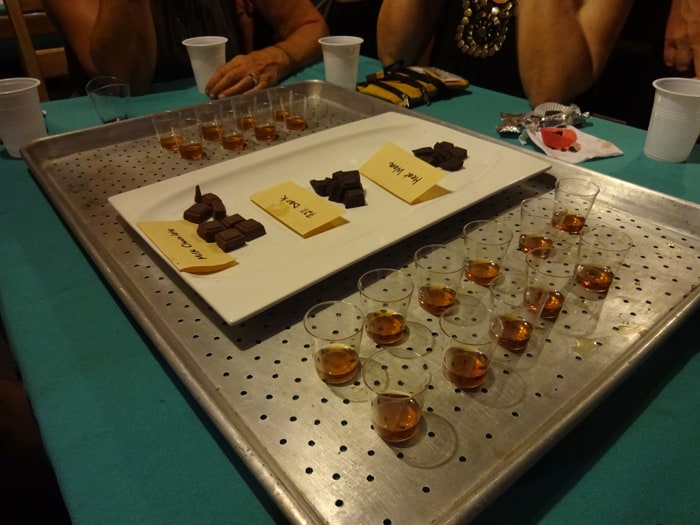
How the travel alert came to be
So I went to the La Costa de Papito hotel and met owner Eddie Ryan, who is 67 but looks a decade younger, and who devoured most of four pancakes while talking to me in a pronounced New York accent. Ryan is vice president of the local Chamber of Tourism and administrator of a special security committee, and the meeting with the U.S. Embassy was held here at his hotel.
The consensus of this meeting, Ryan said, was that things were markedly better now than at the last meeting in August.
“What had happened was that when they [an investigative group from the U.S. Embassy] had come out in August, they came and heard that there had been some assaults of tourists, and that feedback was given by the investigative group to the government, and the response was very strong on the part of the government,” Ryan said. “Obviously, you’re inviting somebody to come in and inspect the house, and if somebody comes in and finds it dirty…
“There was a really strong response, most specifically on the part of the Tourism Police, who, here, we’re blessed with those guys.”
Ryan recited the entire history of the travel alert as the aroma of maple syrup wafted from his breakfast plate.
“Almost three years ago now, there was a criminal band here that in a short span of time did a lot of damage, and it was headline news,” he said. “There were hotel invasions, ordinary assaults, and the whole thing culminated right across the river here in Bribrí in a nighttime attack on a commercial establishment, a small Palestinian family … a nighttime attack, and the 15-year-old daughter was killed.”
In late February 2013, according to media reports, 18 tourists, mostly from the U.S., were robbed at gunpoint of an estimated $6,000 in cash and valuables by five masked men who invaded the remote Samasati Nature Retreat outside Hone Creek, just west of Puerto Viejo.
The very next night, masked men said to have Costa Rican accents invaded a store owned by a Palestinian family in Las Delicias, just across the Sixaola River in Panama. When the family tried to defend itself with armed force, a 15-year-old girl was killed and two of her family members wounded.
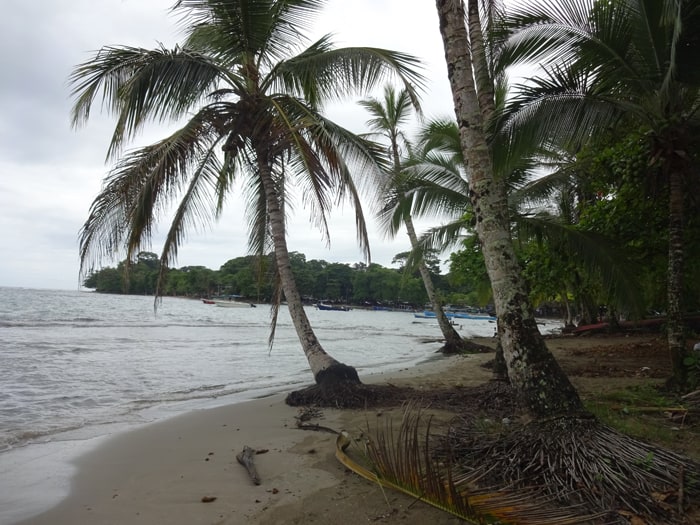
The next month, on March 27, the U.S. Embassy issued a travel alert saying, in part:
“Security Message: Increase in Armed Robberies in Puerto Viejo
“Within the last few weeks, the Embassy has received increased reports of armed robberies of tourists in the Puerto Viejo area. In light of this situation, the U.S. Embassy advises U.S. citizens living in or visiting the Puerto Viejo area to remain cautious and vigilant with regard to their personal safety and security.
“In the past four weeks, three armed robberies of U.S. citizens have occurred in the Puerto Viejo area, in addition to armed invasions of two hotels and one residence. … Armed robbery continues to be the primary criminal threat facing tourists in the Southern Caribbean Coast of Costa Rica.”
Ryan said, “It ended up in a huge manhunt, and the eight people were quickly captured. It was front-page news here and it was news internationally.”
He said it brought a lot of negative attention to the area, in part because many of the robbery victims were tourists. The bad publicity got the attention of a number of embassies and security agencies, Ryan said, and there was a “huge meeting” in 2013 where “all kinds of commitments were made to the area.”
Last year, Ryan said, the then-vice minister of public security, Gustavo Mata, who is now the actual security minister, “took a personal interest in this area,” and thought it unfair that a travel alert was still in place after all this time had gone by. Mata promised the local community a “rendición de cuentas,” a settling of accounts, and he made a public plea to the consul of the U.S. Embassy to lift the alert.
The embassy later sent an investigative team to meet with expats and police agencies in Puerto Viejo. And after a U.S. ambassador to Costa Rica, Stafford Fitzgerald Haney, was finally confirmed last June, he also came to Puerto Viejo a few months later.
“The now newly appointed American ambassador to the country paid a visit to talk to American citizens, to follow up on the security situation and say that this investigative committee would be returning in a few months to do another follow-up,” Ryan said.
“On Tuesday, that was the follow-up,” Ryan said. “They met with, again, American citizens and then later met with the whole security setup, the government.”
“And what were the citizens saying?” I asked.
“What you heard from people was that these guys did a really good job. Really good job,” Ryan said. “Praising the police.”
The outcome of the meeting was that the embassy would continue to monitor the situation and assess whether the alert was still appropriate.
In response to an inquiry from The Tico Times, the embassy replied:
“The protection of U.S. citizens overseas is one of the Department of State’s highest priorities, and the Embassy provides information to U.S. citizens on security and other considerations that should be noted when they travel. Embassies periodically evaluate the Country Specific Information (CSI) provided to U.S. citizens through the State Department’s website, and coordinate closely with the Bureau of Consular Affairs in Washington and Diplomatic Security to determine whether language should be modified or removed from the CSI. The Embassy is currently evaluating the language in the CSI for Costa Rica.”
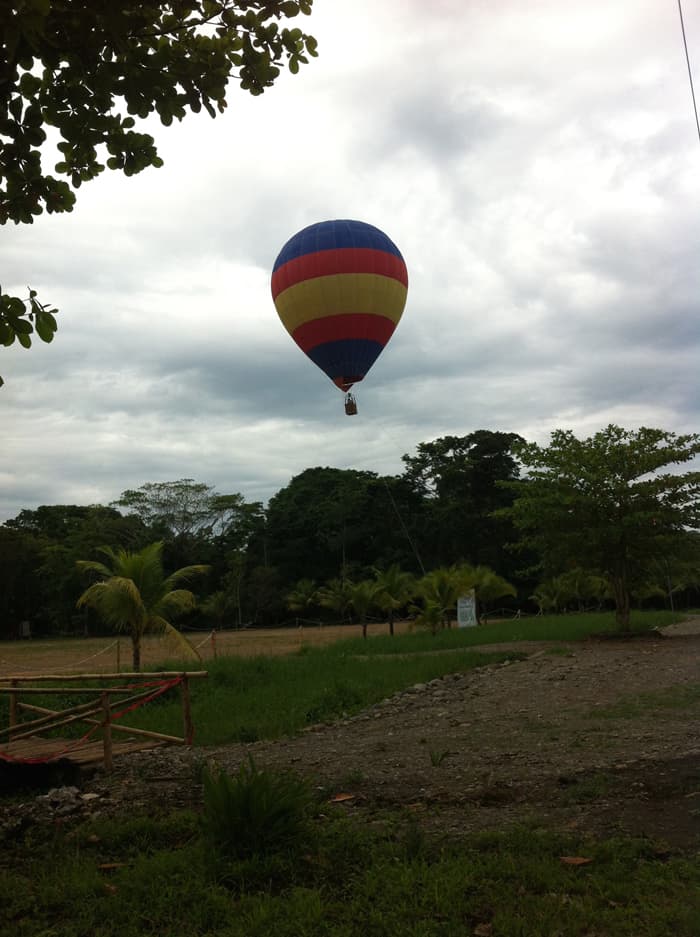
The top cop
I walked to the top floor of the Tourism Police headquarters to meet the chief, Henry Díaz, and as soon as I sat down to interview him, I started sweating profusely in the warm upper room.
After several questions the chief, noting the beads of sweat on my forehead, brought a fan down from a shelf, put it on his desk and pointed it at me.
I laughed and said, “Don’t worry, I sweat a lot.” (Of course I wondered if he thought that was nervous sweat, since I was talking to the police, but it was just sweat.)
“First,” I asked, “can you tell me about whether crime statistics have gone up or gone down?
“They’ve gone down. Notably,” said the chief.
“Since when?”
“Since August,” he said. “The statistics have gone down noticeably because we’ve organized at an institutional level, with a security committee, and that security committee has united us.”
“Security committee?”
“All the institutions, the OIJ, the Tourism Police, the National Police, the Prosecutor’s Office, we’ve united and we’ve worked together, lowering the statistics by 48 percent.”
“Forty-eight percent?”
“Yes, the criminal statistics in the South Caribbean.”
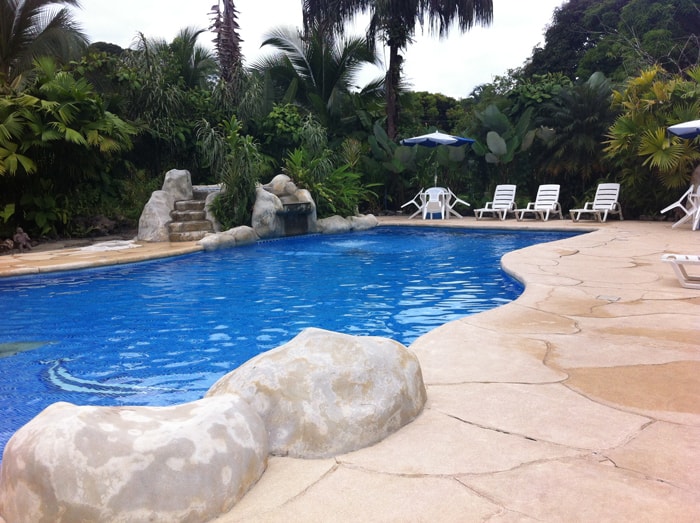
“Of all types of crime?”
“Yes, robbery, assault, theft, car break-ins, everything has been going down.”
“And why is that?”
“Because of the types of operations we’re implementing in the region.”
“What type of operations?”
“We do operations at night, with the OIJ, and we’ve done operations with undercover drug buys.”
Díaz agreed that the travel alert came as a result of a crime wave that no longer exists. “Now we’re in a normal period,” he said. Of course, that doesn’t mean there’s no crime anymore.
“If we find them at night, they move to the day,” he said. “If we control them in Playa Negra, they want to move to Punta Uva.”
I told the chief I had heard from Eddie Ryan that crime stats showed Puerto Viejo was safer than Jacó or Quepos.
“We have statistics showing that crime is about 50 percent lower in the Southern (Caribbean) than in Jacó, Quepos and other places,” the chief said.
There was not a bead of sweat on his face.
Community organizers
I went to see Nick Varnum, 62, and his wife Janet Jones, 53, local business owners who have been very active in security issues. They moved here permanently five years ago from Oregon, and they’re co-owners of the Hot Rocks bar and Wahoo Fishing and Tours.
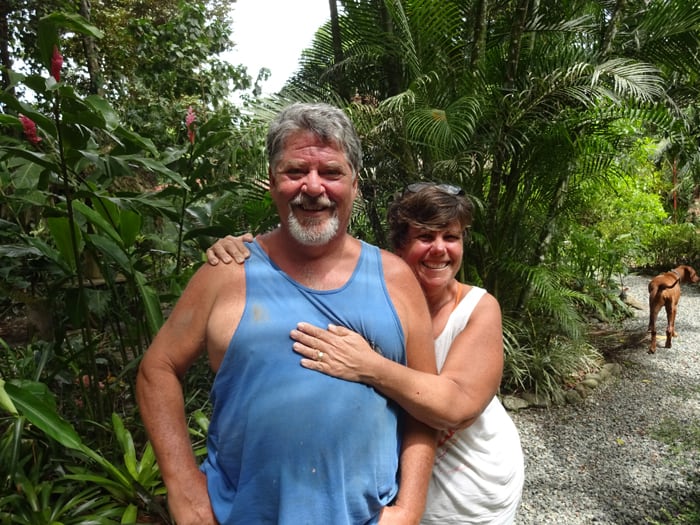
“Most people will tell you we’re not the target population for the violence and things,” Janet said. “It’s, frankly, people out at 2 in the morning stoned, high, whatever. That’s the bulk of the violent crime, not that it makes it OK. But you know, it’s preventable because we can educate people not to be out at 2 in the morning, or at least not to be walking stoned down the road.”
I asked if there were a lot of late-night assaults.
“I hear about maybe one a week, something like that,” Nick said. “There’s a couple of well-known areas that seem to get hit a lot.”
And where are those?
“Oh, between Tasty Waves and town, people walking back from the big Tuesday night thing they have.” (Tasty Waves is a hopping bar about 1 kilometer southeast of downtown.)
Eight years ago, to combat near-daily thefts on the beach, Nick and Janet helped start a beach guard program, hiring private security guards to patrol the beaches south of Puerto Viejo.
“And when that got going, it really, really made a huge difference along the beach here,” Nick said.
Janet said now they hear about a theft on the beach about every three or four months, though she heard of two incidents this month. “It used to be honestly almost every day there’d be some kind of petty crime” on local beaches, she said.
Nick and Janet also helped started an unofficial security council that established safe spots where victims of crime could go for help. The group has a telephone tree to share information about security. Many residents also participate in the police’s Barrio Organizado neighborhood watch program.
Nick’s most ambitious initiative was a program to install security cameras on the three roads that lead in and out of this coastal area. He set a goal of raising $15,000 for this program in five weeks from area residents. Two weeks into this effort, the girl in Las Delicias was killed, and contributions swelled to $23,000.
Nick and a couple of others bought 12 cameras, installed them in three locations and kept the program running for almost two years. But two of the cameras were vandalized and broken, and there were problems getting Internet connections that allowed the cameras to be monitored remotely.
“We also set up a bunch of equipment at the Touristic Police office,” Nick said, “with a big screen and computer so that all this stuff would feed into them, which never quite got functioning for this reason and that.”
But Janet said this “bare-bones program” was getting results.
“People were getting identified,” she said. “It’s hard to say they were being caught or prosecuted because that’s a totally different beast, but they were being identified.”
Needing to raise more money to maintain, improve and expand the program, Nick set out to raise an additional $25,000. He said there was a big meeting attended by officials from various police agencies, and the Public Security Ministry announced that it was going to take charge of the program and expand it to nearly 60 cameras.
“And they started drawing up plans and maps and everything else,” Nick said. “And we asked them, ‘Well what about these [existing cameras]?’ And they said, ‘This is now a police action. We are going to take over these cameras.’ Great!
“They never touched them. So they sat there for a year gathering dust, and now most of them are in dire need of maintenance.”
Díaz, the Tourism Police chief, showed me detailed plans for the expanded camera program but said it’s very expensive and there isn’t enough funding.
Janet said the government’s lack of follow-through – its “faulty process at either prosecuting or following up on crime” – is part of the problem here. Another, she said, is “anarchist” expats who criticize efforts to improve security.
“That’s what happened with the camera project,” she said. “People said, ‘You’re making this a police state, I didn’t move here to be surveiled and blah-blah-blah-blah-blah.’”
Nick and Janet asked me to mention that a benefit for the beach guard program will be held Nov. 22 from 1 to 5 p.m. at Punta Uva Lounge, with food and music, and all are welcome.
“At the end of the day, we want to reduce crime,” Janet said. “We also want to assist people who are victims of crime. But we don’t want to be inappropriately labeled because we’re doing something about it instead of turning a blind eye.”
Theft? What theft?
So what happened to the supposed bicycle thief handcuffed to the steel window bars at the Tourism Police station?
Toward the end of my interview with the chief, an officer came to the door and explained that there was no denuncia against the suspect, no complaint.
The chief explained to me that they had investigated the suspect and found that he had never been booked or fingerprinted, that he was not wanted, and that there was no formal complaint against him, so they had no cause to hold him and had to let him go.
I thanked the chief for the interview and walked back downstairs, where I noticed that the handcuffs had been removed from the man of WhatsApp fame, and he was now casually answering questions from the cop at the front desk.
I walked back to my car and sat awhile, trying to return two phone calls I had received while in the police station. The bicycle guy walked past me and again looked me over.
I drove down the narrow gravel road to the highway, but found my way blocked by a “Policía Turistica” truck with three or four people in it, stopped to talk to the former burglary suspect.
I pulled over and waited. And then I saw that the police had stopped to give the guy something out of the back of their truck.
It was a bicycle.
For more info:
U.S. travel alert on Puerto Viejo: http://costarica.usembassy.gov/messages/increase-in-armed-robberies.html
U.S. travel alert on Limón Province: http://costarica.usembassy.gov/messages/security-message-violence-in-the-limon-province.html
Contact Karl Kahler at kkahler@ticotimes.net.

